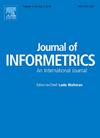Acknowledging the new invisible colleague: Addressing the recognition of Open AI contributions in in scientific publishing
IF 3.5
2区 管理学
Q2 COMPUTER SCIENCE, INTERDISCIPLINARY APPLICATIONS
引用次数: 0
Abstract
This study investigates the evolving role of AI tools, such as ChatGPT, in academic research, with a focus on whether these tools are recognized as authors or co-authors, and how their contributions are cited or acknowledged across various fields. Using data from two major bibliometric sources, Web of Science Core Collection and Scopus, the analysis reveals patterns of AI citation, co-authorship, and acknowledgments. While some attempts have been made to credit AI as a co-author, ethical guidelines—such as those from COPE—prevent this due to AI's inability to fulfill the intellectual requirements for authorship. Instead, AI is increasingly cited as a source or mentioned in acknowledgments to ensure transparency in its use. The study further addresses the ethical implications of AI's role in disrupting traditional notions of intellectual reciprocity and bibliometric analysis. The future role of AI in research will depend on how challenges related to access, equity, and intellectual contribution are managed, determining whether AI will democratize research or exacerbate existing inequalities.
承认新的隐形同事:解决在科学出版中对开放人工智能贡献的承认问题
本研究调查了人工智能工具(如ChatGPT)在学术研究中的演变作用,重点关注这些工具是否被认可为作者或共同作者,以及它们的贡献如何在各个领域被引用或认可。使用来自两个主要文献计量来源的数据,Web of Science Core Collection和Scopus,分析揭示了人工智能引文、共同作者和致谢的模式。虽然有些人试图将人工智能作为合著者,但伦理准则——比如来自cope的准则——阻止了这一点,因为人工智能无法满足作者的智力要求。相反,人工智能越来越多地被引用为来源或在致谢中提及,以确保其使用的透明度。该研究进一步探讨了人工智能在颠覆智力互惠和文献计量分析的传统观念方面所起的伦理影响。人工智能在研究中的未来作用将取决于如何管理与获取、公平和智力贡献相关的挑战,这决定了人工智能是会使研究民主化,还是会加剧现有的不平等。
本文章由计算机程序翻译,如有差异,请以英文原文为准。
求助全文
约1分钟内获得全文
求助全文
来源期刊

Journal of Informetrics
Social Sciences-Library and Information Sciences
CiteScore
6.40
自引率
16.20%
发文量
95
期刊介绍:
Journal of Informetrics (JOI) publishes rigorous high-quality research on quantitative aspects of information science. The main focus of the journal is on topics in bibliometrics, scientometrics, webometrics, patentometrics, altmetrics and research evaluation. Contributions studying informetric problems using methods from other quantitative fields, such as mathematics, statistics, computer science, economics and econometrics, and network science, are especially encouraged. JOI publishes both theoretical and empirical work. In general, case studies, for instance a bibliometric analysis focusing on a specific research field or a specific country, are not considered suitable for publication in JOI, unless they contain innovative methodological elements.
 求助内容:
求助内容: 应助结果提醒方式:
应助结果提醒方式:


